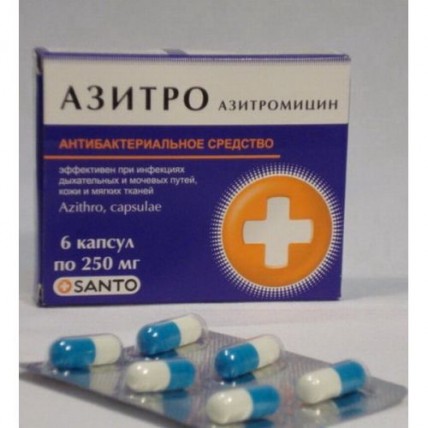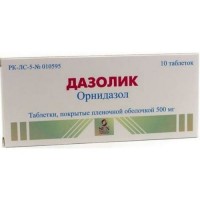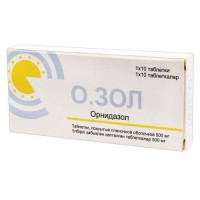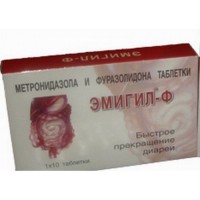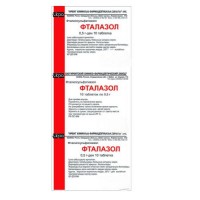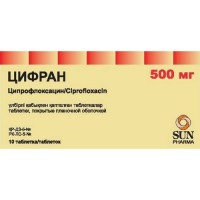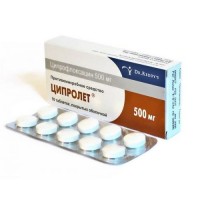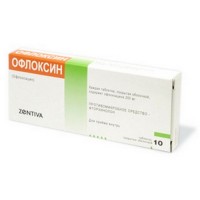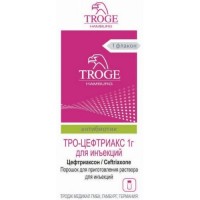Azitro 250 mg (6 capsules)
- $19.00
The instruction for medical use
of Azitro® medicine
the Trade name
of Azitro®
the International unlicensed
name Azithromycin Dosage Form
of the Capsule of 250 mg
Structure
One capsule contains
active agent - dihydrate azithromycin
(in terms of azithromycin) 250.0 mg,
excipients: lactoses monohydrate, potato starch, polysorbate-80, calcium stearate,
structure of a gelatin capsule: gelatin, titan dioxide (E 171), methylparahydroxybenzoate, propilparagidroksibenzoat
Description
Solid gelatin capsules of white color. Size of capsule No. 1. Contents of capsules – granules of white or almost white color
Pharmacotherapeutic group
Antibacterial drugs for system use.
Macroleads
the ATX J01FA10 Code
the Pharmacological
Pharmacokinetics At properties intake azithromycin is quickly soaked up from digestive tract that is caused by its stability in acidic environment and lipophilicity and distribution on all organism. Meal reduces azithromycin absorption. The maximum concentration in plasma is reached in 2-3 hours. Azithromycin well gets into airways, bodies and fabrics of an urogenital path, a prostate, into skin and soft tissues. High concentration in fabrics (is 50 times higher, than concentration in plasma) and the long half-life period is caused by low linking of azithromycin with proteins of blood plasma and also its ability to get into eukaryotic cells and to concentrate in the environment with a low rn, a surrounding lysosome. The ability of azithromycin to collect in lysosomes is especially important for elimination of intracellular activators. Phagocytes deliver azithromycin to places of localization of an infection where it is released in the course of phagocytosis. But despite high concentration in phagocytes, azithromycin does not affect their function. Azithromycin remains in bactericidal concentration in the inflammation center within 5-7 days after reception of the last dose that allowedshort (3-day and 5-day) courses of treatment. Removal of azithromycin from blood plasma happens in 2 stages: elimination half-life (T1/2) makes 14-20 h in the range from 8 h up to 24 h after administration of drug and 41 h – in the range from 24 h up to 72 h that allows to use drug of 1 times/days. About 50% are removed in not changed look, other 50% - in the form of 10 inactive metabolites. Drug, generally with bile in not changed look is emitted, a small part (about 6%) is removed by kidneys.
The pharmacodynamics
of Azitro® is an antibiotic of a broad spectrum of activity, the first representative of new subgroup of makrolidny antibiotics – azaleads. Possesses bacteriostatic action, but during creation in the center of inflammation of high concentrations causes bactericidal effect. Connecting 50S a ribosome subunit, azitro suppresses synthesis of protein in sensitive microorganisms.
It is active concerning aerobic gram-positive bacteria: Streptococcus pneumoniae, S. pyogenes, S. agalactiae, S. viridans, streptococci of the groups C, F and G, Staphylococcus aureus, S. epidermidis. It is effective concerning aerobic gram-negative bacteria: Haemophilus influenzae, H. Parainfluenzae and H. ducreyi, Moraxella catarrhalis, Bordetella pertussis, B. parapertussis, Neisseria gonorrhoeae and N. meningitidis, Helicobacter pylori, Legionella pneumophila, Campylobacter jejuni, Gardnerella vaginalis. It is active concerning some anaerobic microorganisms: Bacteroides bivius, Clostridium perfringens, Peptostreptococcus spp. Besides, C. pneumoniae, Mycoplasma pneumoniae, Ureaplasma urealyticum, Listeria monocytogenes, Treponema pallidum, Borrelia burgdorferi is effective concerning Chlamydia trachomatis. To drug the gram-positive bacteria resistant are resistant to erythromycin.
Indications
Infectious and inflammatory diseases, caused by microorganisms, sensitive to drug:
- the tonsillitis, pharyngitis, sinusitis, tonsillitis, average otitis
- chronic bronchitis in an aggravation stage, extra hospital or
hospital pneumonia
- the ugly face, impetigo which are again infected a dermatosis
- Lyme's disease (for treatment of an initial stage)
- the diseases of a stomach and a duodenum associated with
Helicobacter pylori (as a part of combination therapy)
- diseases, sexually transmitted (including the urethritis, tservitit,
genital and extragenital clamidiosis)
the Route of administration and doses
use Drug inside, for 1 h to food or in 2 h after a meal, 1 times a day.
The adult Angina, pharyngitis, sinusitis, tonsillitis, average otitis
Chronic bronchitis in an aggravation stage, pneumonia
the Ugly face, impetigo which are again infected a dermatosis
Appoint on 500 mg in the 1st day, then on 250 mg from 2nd for the 5th days or on 500 mg/days within 3 days (a course dose - 1.5 g).
The urethritis, a cervicitis, clamidiosis
Appoint once 1 g (4 capsules on 250 mg).
Lyme's disease for treatment of an initial stage (erythema migrans)
is Appointed on 1 g (4 capsules on 250 mg) in the 1st day and on 500 mg daily from the 2nd to the 5th day (a course dose – 3 g).
Diseases of a stomach and a duodenum, assotsiirovannekh with Helicobacter pylori
Appoint 1 g (4 capsules on 250 mg) in day within 3 days as a part of combination therapy.
Children are 12 years old and are more senior
Appoint tablets of 500 mg to children of 12 years and more than 45 kg 1 times/day within 3 days or in the first day on 10 mg/kg of body weight, then on 5 - 10 mg/kg of body weight a day within 3 days are more senior with body weight. At body weight less than 45 kg it is necessary to take other dosage form.
At treatment of the first stage of a disease of Lyme: the dose makes 20 mg/kg of body weight in the first day and on 10 mg/kg of body weight from 2 to 5 day.
At the admission of reception of 1 dose it is necessary to accept the passed dose as soon as possible, and the subsequent with a break of 24 h.
Older persons have no need to change a dosage.
Side effects
Often
- nausea, vomiting, diarrhea, an abdominal pain
Seldom
- a tromotsitopeniya
- aggression, excitement, concern, nervousness, insomnia
- paresthesias, an asthenia
- reversible decrease in hearing and sonitus
- arrhythmias, lengthening of an interval of QT
- loss of appetite, a meteorism, a constipation, pseudomembranous colitis
- tranzitorny rise in level of aminotransferases of a liver, bilirubin,
cholestatic jaundice, hepatitis
- reactions of hypersensitivity (reddening, skin rash, an itching,
a Quincke's disease, photosensitivity), a multiformny
erythema, Stephen-Johnson's syndrome and a toxic epidermal
necrolysis, an acute anaphylaxis
- interstitial nephrite, an acute renal failure
Very seldom
- fatigue, a headache, dizziness, convulsions
- change of taste and sense of smell
- an arthralgia
- vaginita, candidiasis,
Contraindication superinfections
- hypersensitivity to azithromycin and antibiotics
of group of macroleads
- heavy abnormal liver functions
- heavy renal failures
- children's and teenage age up to 12 years
- pregnancy and the period of a lactation
Medicinal interactions
Antacids (aluminum and magniysoderzhashchy), ethanol and food slow down and reduce absorption of Azitro®.
At joint prescribing of warfarin and Azitro® (in usual doses) changes of a prothrombin time it is not revealed, however, considering that in interaction of macroleads and warfarin strengthening of anti-coagulative effect is possible, careful control of a prothrombin time is necessary for patients.
Digoxin: Азитро® increases concentration of digoxin.
Ergotamine and dihydroergotamine: strengthening of toxic action (vasospasm, dizesteziya).
To triazoles: Азитро® causes decrease in clearance and strengthening of pharmacological action of a triazolan.
Азитро® slows down removal and increases concentration in blood plasma and toxicity of Cycloserinum, indirect anticoagulants, Methylprednisolonum, a felodipin and also the medicines which are exposed to microsomal oxidation (carbamazepine, terfenadin, cyclosporine, hexobarbital, ergot alkaloids, valproic acid, Disopyramidum, Bromocriptinum, Phenytoinum, oral hypoglycemic means, theophylline, etc. ksantinovy derivatives) - at the expense of inhibition of microsomal oxidation in hepatocytes. Linkozamina weaken efficiency of Azitro®, tetracycline and chloramphenicol - strengthen.
The special
instructions Be careful when prescribing drug the patient with insufficiency of function of a liver and kidneys, disturbance of a warm rhythm (ventricular arrhythmias and lengthening of an interval of QT are possible).
It is necessary to observe a break of 2 h at simultaneous use of antacids.
After cancellation of treatment of reaction of hypersensitivity at some patients can remain that demands purpose of specific therapy under observation of the doctor.
Features of influence of medicine on ability to run the vehicle or potentially dangerous mechanisms
Considering side effects of medicine, it is necessary to be careful at control of motor transport and potentially dangerous mechanisms.
Overdose
Symptoms: temporary hearing loss, nausea, vomiting and diarrhea.
Treatment is symptomatic.
A form of release and packing
On 6 capsules in blister strip packaging from a film of polyvinylchloride and aluminum foil.
On 1 blister strip packaging together with the approved instruction for medical use in the state and Russian languages place in a pack from cardboard.
To Store storage conditions in the dry, protected from light place, at
a temperature not above 30 °C.
To store in the inaccessible place of children!
A period of storage
3 years
not to apply after an expiration date
Prescription status
According to the prescription
JSC Khimfarm Producer,
REPUBLIC OF KAZAKHSTAN Shymkent, Rashidov St.,/N, ph.: 560882
The owner of the registration certificate
of JSC Khimfarm, the REPUBLIC OF KAZAKHSTAN
the Address of the organization accepting in the territory of the Republic of Kazakhstan claims from consumers on quality of products (goods) of JSC Khimfarm, Shymkent, REPUBLIC OF KAZAKHSTAN, Rashidov St.,/N, ph.: 560882 Phone number 7252 (561342) Fax number 7252 (561342)
the E-mail address of standart@santo.kz
of Azitro® medicine
the Trade name
of Azitro®
the International unlicensed
name Azithromycin Dosage Form
of the Capsule of 250 mg
Structure
One capsule contains
active agent - dihydrate azithromycin
(in terms of azithromycin) 250.0 mg,
excipients: lactoses monohydrate, potato starch, polysorbate-80, calcium stearate,
structure of a gelatin capsule: gelatin, titan dioxide (E 171), methylparahydroxybenzoate, propilparagidroksibenzoat
Description
Solid gelatin capsules of white color. Size of capsule No. 1. Contents of capsules – granules of white or almost white color
Pharmacotherapeutic group
Antibacterial drugs for system use.
Macroleads
the ATX J01FA10 Code
the Pharmacological
Pharmacokinetics At properties intake azithromycin is quickly soaked up from digestive tract that is caused by its stability in acidic environment and lipophilicity and distribution on all organism. Meal reduces azithromycin absorption. The maximum concentration in plasma is reached in 2-3 hours. Azithromycin well gets into airways, bodies and fabrics of an urogenital path, a prostate, into skin and soft tissues. High concentration in fabrics (is 50 times higher, than concentration in plasma) and the long half-life period is caused by low linking of azithromycin with proteins of blood plasma and also its ability to get into eukaryotic cells and to concentrate in the environment with a low rn, a surrounding lysosome. The ability of azithromycin to collect in lysosomes is especially important for elimination of intracellular activators. Phagocytes deliver azithromycin to places of localization of an infection where it is released in the course of phagocytosis. But despite high concentration in phagocytes, azithromycin does not affect their function. Azithromycin remains in bactericidal concentration in the inflammation center within 5-7 days after reception of the last dose that allowedshort (3-day and 5-day) courses of treatment. Removal of azithromycin from blood plasma happens in 2 stages: elimination half-life (T1/2) makes 14-20 h in the range from 8 h up to 24 h after administration of drug and 41 h – in the range from 24 h up to 72 h that allows to use drug of 1 times/days. About 50% are removed in not changed look, other 50% - in the form of 10 inactive metabolites. Drug, generally with bile in not changed look is emitted, a small part (about 6%) is removed by kidneys.
The pharmacodynamics
of Azitro® is an antibiotic of a broad spectrum of activity, the first representative of new subgroup of makrolidny antibiotics – azaleads. Possesses bacteriostatic action, but during creation in the center of inflammation of high concentrations causes bactericidal effect. Connecting 50S a ribosome subunit, azitro suppresses synthesis of protein in sensitive microorganisms.
It is active concerning aerobic gram-positive bacteria: Streptococcus pneumoniae, S. pyogenes, S. agalactiae, S. viridans, streptococci of the groups C, F and G, Staphylococcus aureus, S. epidermidis. It is effective concerning aerobic gram-negative bacteria: Haemophilus influenzae, H. Parainfluenzae and H. ducreyi, Moraxella catarrhalis, Bordetella pertussis, B. parapertussis, Neisseria gonorrhoeae and N. meningitidis, Helicobacter pylori, Legionella pneumophila, Campylobacter jejuni, Gardnerella vaginalis. It is active concerning some anaerobic microorganisms: Bacteroides bivius, Clostridium perfringens, Peptostreptococcus spp. Besides, C. pneumoniae, Mycoplasma pneumoniae, Ureaplasma urealyticum, Listeria monocytogenes, Treponema pallidum, Borrelia burgdorferi is effective concerning Chlamydia trachomatis. To drug the gram-positive bacteria resistant are resistant to erythromycin.
Indications
Infectious and inflammatory diseases, caused by microorganisms, sensitive to drug:
- the tonsillitis, pharyngitis, sinusitis, tonsillitis, average otitis
- chronic bronchitis in an aggravation stage, extra hospital or
hospital pneumonia
- the ugly face, impetigo which are again infected a dermatosis
- Lyme's disease (for treatment of an initial stage)
- the diseases of a stomach and a duodenum associated with
Helicobacter pylori (as a part of combination therapy)
- diseases, sexually transmitted (including the urethritis, tservitit,
genital and extragenital clamidiosis)
the Route of administration and doses
use Drug inside, for 1 h to food or in 2 h after a meal, 1 times a day.
The adult Angina, pharyngitis, sinusitis, tonsillitis, average otitis
Chronic bronchitis in an aggravation stage, pneumonia
the Ugly face, impetigo which are again infected a dermatosis
Appoint on 500 mg in the 1st day, then on 250 mg from 2nd for the 5th days or on 500 mg/days within 3 days (a course dose - 1.5 g).
The urethritis, a cervicitis, clamidiosis
Appoint once 1 g (4 capsules on 250 mg).
Lyme's disease for treatment of an initial stage (erythema migrans)
is Appointed on 1 g (4 capsules on 250 mg) in the 1st day and on 500 mg daily from the 2nd to the 5th day (a course dose – 3 g).
Diseases of a stomach and a duodenum, assotsiirovannekh with Helicobacter pylori
Appoint 1 g (4 capsules on 250 mg) in day within 3 days as a part of combination therapy.
Children are 12 years old and are more senior
Appoint tablets of 500 mg to children of 12 years and more than 45 kg 1 times/day within 3 days or in the first day on 10 mg/kg of body weight, then on 5 - 10 mg/kg of body weight a day within 3 days are more senior with body weight. At body weight less than 45 kg it is necessary to take other dosage form.
At treatment of the first stage of a disease of Lyme: the dose makes 20 mg/kg of body weight in the first day and on 10 mg/kg of body weight from 2 to 5 day.
At the admission of reception of 1 dose it is necessary to accept the passed dose as soon as possible, and the subsequent with a break of 24 h.
Older persons have no need to change a dosage.
Side effects
Often
- nausea, vomiting, diarrhea, an abdominal pain
Seldom
- a tromotsitopeniya
- aggression, excitement, concern, nervousness, insomnia
- paresthesias, an asthenia
- reversible decrease in hearing and sonitus
- arrhythmias, lengthening of an interval of QT
- loss of appetite, a meteorism, a constipation, pseudomembranous colitis
- tranzitorny rise in level of aminotransferases of a liver, bilirubin,
cholestatic jaundice, hepatitis
- reactions of hypersensitivity (reddening, skin rash, an itching,
a Quincke's disease, photosensitivity), a multiformny
erythema, Stephen-Johnson's syndrome and a toxic epidermal
necrolysis, an acute anaphylaxis
- interstitial nephrite, an acute renal failure
Very seldom
- fatigue, a headache, dizziness, convulsions
- change of taste and sense of smell
- an arthralgia
- vaginita, candidiasis,
Contraindication superinfections
- hypersensitivity to azithromycin and antibiotics
of group of macroleads
- heavy abnormal liver functions
- heavy renal failures
- children's and teenage age up to 12 years
- pregnancy and the period of a lactation
Medicinal interactions
Antacids (aluminum and magniysoderzhashchy), ethanol and food slow down and reduce absorption of Azitro®.
At joint prescribing of warfarin and Azitro® (in usual doses) changes of a prothrombin time it is not revealed, however, considering that in interaction of macroleads and warfarin strengthening of anti-coagulative effect is possible, careful control of a prothrombin time is necessary for patients.
Digoxin: Азитро® increases concentration of digoxin.
Ergotamine and dihydroergotamine: strengthening of toxic action (vasospasm, dizesteziya).
To triazoles: Азитро® causes decrease in clearance and strengthening of pharmacological action of a triazolan.
Азитро® slows down removal and increases concentration in blood plasma and toxicity of Cycloserinum, indirect anticoagulants, Methylprednisolonum, a felodipin and also the medicines which are exposed to microsomal oxidation (carbamazepine, terfenadin, cyclosporine, hexobarbital, ergot alkaloids, valproic acid, Disopyramidum, Bromocriptinum, Phenytoinum, oral hypoglycemic means, theophylline, etc. ksantinovy derivatives) - at the expense of inhibition of microsomal oxidation in hepatocytes. Linkozamina weaken efficiency of Azitro®, tetracycline and chloramphenicol - strengthen.
The special
instructions Be careful when prescribing drug the patient with insufficiency of function of a liver and kidneys, disturbance of a warm rhythm (ventricular arrhythmias and lengthening of an interval of QT are possible).
It is necessary to observe a break of 2 h at simultaneous use of antacids.
After cancellation of treatment of reaction of hypersensitivity at some patients can remain that demands purpose of specific therapy under observation of the doctor.
Features of influence of medicine on ability to run the vehicle or potentially dangerous mechanisms
Considering side effects of medicine, it is necessary to be careful at control of motor transport and potentially dangerous mechanisms.
Overdose
Symptoms: temporary hearing loss, nausea, vomiting and diarrhea.
Treatment is symptomatic.
A form of release and packing
On 6 capsules in blister strip packaging from a film of polyvinylchloride and aluminum foil.
On 1 blister strip packaging together with the approved instruction for medical use in the state and Russian languages place in a pack from cardboard.
To Store storage conditions in the dry, protected from light place, at
a temperature not above 30 °C.
To store in the inaccessible place of children!
A period of storage
3 years
not to apply after an expiration date
Prescription status
According to the prescription
JSC Khimfarm Producer,
REPUBLIC OF KAZAKHSTAN Shymkent, Rashidov St.,/N, ph.: 560882
The owner of the registration certificate
of JSC Khimfarm, the REPUBLIC OF KAZAKHSTAN
the Address of the organization accepting in the territory of the Republic of Kazakhstan claims from consumers on quality of products (goods) of JSC Khimfarm, Shymkent, REPUBLIC OF KAZAKHSTAN, Rashidov St.,/N, ph.: 560882 Phone number 7252 (561342) Fax number 7252 (561342)
the E-mail address of standart@santo.kz
